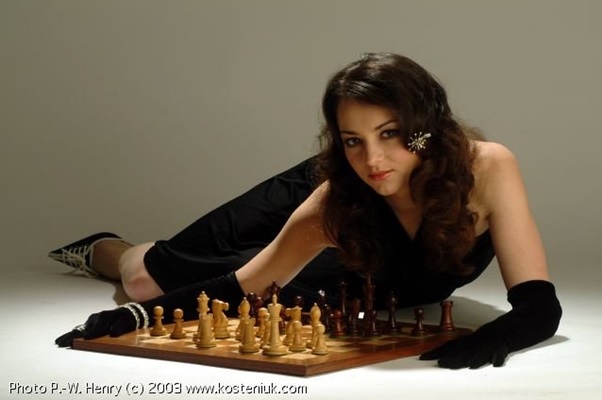
The top picture is of former European Women's Chess Champion Alexandra Kosteniuk. It is there to show chess has become quite sexy. Magnus Carlsen has spent his entire life since being a youngster constantly reminding us that it is still quite smart, too!

Congratulations to Magnus Carlsen – New 2016 World Chess Champion!
“Chess, the eminently cerebral game, is even thought provoking in ways unrelated to the movement of pieces on the board.” Truer words were never spoken. So, begins a piece on chess intelligence by Erk Lief of the American Council on Science and Knowledge. It turns out that the article was inspired by a piece in Michigan State University’s MSU TODAY, also viewed at Science Codex, and that concerned some recent, interesting research on the subject of chess intelligence. All the talk goes back to an article recently published by people at the MSU Expertise Lab, which must be an interesting place. These articles discussed how some researchers from the Expertise Lab arrived at some conclusions about the kind of intelligence required to be good at chess. I think I have a good understanding of the kinds of intelligence required to be a good chess player. How do I know? Because throughout various periods of my life I have spent way too much time playing and studying chess. I love it way too much. When I finally accepted the fact that I would never make Master, then I set out to find out why. The result was worth the effort because it made me feel a little less stupid to finally discover why I will never make Chess Master, even though I would still give my left hand for the privilege.
The research pushed my buttons. For example, here is lead researcher, Alexander Burgoyne, explaining what they discovered in the research. “Chess is probably the single most studied domain in research on expertise, yet the evidence for the relationship between chess skill and cognitive ability is mixed,” said Burgoyne, quoted in a Michigan State report. “We analyzed a half-century worth of research on intelligence and chess skill and found that cognitive ability contributes meaningfully to individual differences in chess skill.”
This is an important piece of research because it summarizes so much previous research into chess intelligence. Researcher David Hambrick said "When it comes to expertise, training and practice certainly are a piece of the puzzle, but this study shows that, for chess at least, intelligence is another piece of the puzzle."
The research design was a meta-analysis that started with nearly 2300 articles representing research into chess intelligence. The team then focused on studies that contained numerical indicators of intelligence and chess expertise, such as IQ scores and the standard chess player’s rating of level called the ELO score. That was an enormous amount of work.
I wasn’t very satisfied with those ideas. Chess intelligence goes a lot deeper than that. So, I decided to look at the article itself. It appears in the journal Intelligence and below I present the abstract with a link. This team did an enormous amount of work in executing this research. I want to be clear and say that because the results are not theirs to be criticized. I was anxious to review this meta-analysis, because it is an important piece of research in the field of chess intelligence. Yet, I was not much more satisfied with the abstract, which is worth duplicating, especially because it is a large meta-analysis. That means this juicy article arguably represents and summarizes about five decades’ worth of research into chess intelligence. This should represent some kind of global statement about the overall skill set required to be a good chess player. By the way, when I say good, I mean Master. Here are the results of the study:
Abstract: Chess skill correlated positively and
significantly with fluid reasoning (Gf) (![]() = 0.24), comprehension-knowledge (Gc) (
= 0.24), comprehension-knowledge (Gc) (![]() = 0.22), short-term memory (Gsm) (
= 0.22), short-term memory (Gsm) (![]() = 0.25), and processing speed (Gs) (
= 0.25), and processing speed (Gs) (![]() = 0.24); the meta-analytic average of the correlations
was (
= 0.24); the meta-analytic average of the correlations
was (![]() = 0.24). Moreover, the correlation between Gf and chess
skill was moderated by age (
= 0.24). Moreover, the correlation between Gf and chess
skill was moderated by age (![]() = 0.32 for youth samples vs.
= 0.32 for youth samples vs. ![]() = 0.11 for adult samples), and skill level (
= 0.11 for adult samples), and skill level (![]() = 0.32 for unranked samples vs.
= 0.32 for unranked samples vs. ![]() = 0.14 for ranked samples). Interestingly, chess skill
correlated more strongly with numerical ability (
= 0.14 for ranked samples). Interestingly, chess skill
correlated more strongly with numerical ability (![]() = 0.35) than with verbal ability (
= 0.35) than with verbal ability (![]() = 0.19) or visuospatial ability (
= 0.19) or visuospatial ability (![]() = 0.13). The results suggest that cognitive ability
contributes meaningfully to individual differences in chess skill, particularly
in young chess players and/or at lower levels of skill.
= 0.13). The results suggest that cognitive ability
contributes meaningfully to individual differences in chess skill, particularly
in young chess players and/or at lower levels of skill.
First, these correlations are not that high, so the associations are not very strong. Second, it is also a little surprising that verbal ability and visuospatial ability are not nearly as positively associated with chess intelligence as numerical ability, which must mean math. It is curious that they have measures of short-term memory but no measures of eidetic memory. Third, it is interesting that the results overall were stronger among young players and lower levels of skill.
Let’s unpack each of these findings and go a little deeper.
1. These correlations are not that high, so the associations are not very strong.
If the correlations were over r = .50, then I would be suitably impressed. But, to me the story here is that measures of intelligence have little correlation, or at least a relatively weak association, with chess expertise. If you asked anyone on the street, everyone would guess that the correlations between chess players and measures of cognitive and intelligence skills would be through the roof. But, one important thing to consider here is the idea that the classic psychology IQ test is actually an interactive experience in which the test taker leads the test giver through a series of questions and problems to solve. At the end, the test giver has scored the test taker, and the result is held up as that person’s IQ score forever.
But, what if you had a bad breakfast that morning, or no breakfast? What if you are slightly autistic and you shy away from interaction? What if you are so shy and withdrawn from social life, and so intelligent at chess, that you could not care less what anybody thought about anything you did - especially your performance on an IQ test? There is reason to believe that an inability to interact well with the test giver for any number of reasons might bias the test giver against the test taker. It is impossible to imagine that the test giver has never erred either for or against the score given to every child ever tested.
2. Verbal ability and visuospatial ability are less associated with chess intelligence than numerical ability, which must mean mathematical ability … no measures of eidetic memory.
Chess players are not the most sociable people on the planet. They are certainly not all diagnosably autistic, but among Chess Masters there is unquestionably a predilection for the kind of person who is quiet, even-tempered, patient, inquisitive, and contemplative. However, there is also a predilection for people with language gifts. As many world chess champions have been journalists as mathematicians or engineers. Many of these people are also multilingual. For a Chess Master, chess is like learning and speaking another language. But, the elite player learns not to speak that language too literally, which is what all the mere mortals do, again and again. There is literal chess, and then there is poetic chess, and the greatest masters have composed games as eloquent as any piece of music or art.
References
Burgoyne, A. P., Sala, G., Gobet, F., Macnamara, B. N., Campitelli, G.&Hambrick, D. Z. (2016). The relationship between cognitive ability and chess skill: A comprehensive meta-analysis. Intelligence. http://dx.doi.org/10.1016/j.intell.2016.08.002
~End Part 1 – Part 2 Thursday – Part 3 Next Monday~



Comments